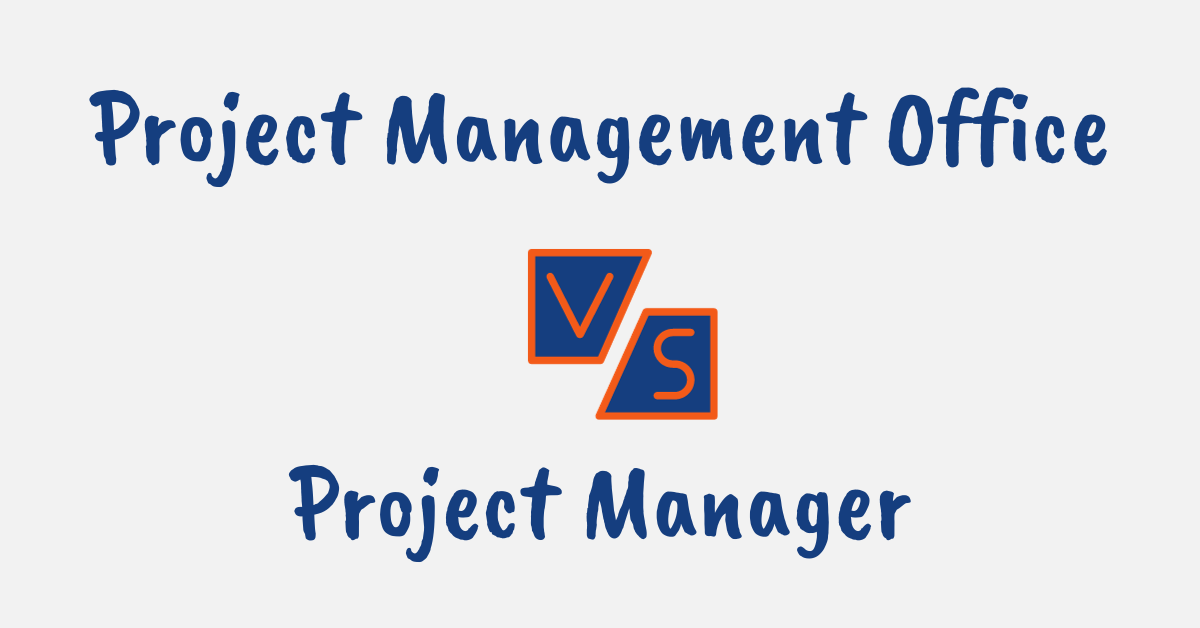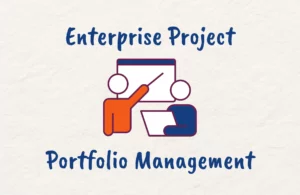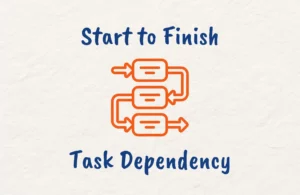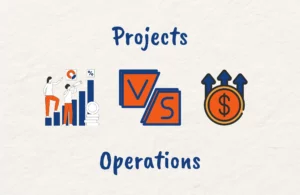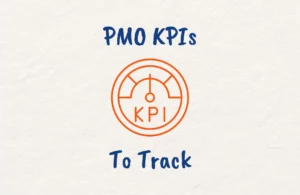The Project Management Office (PMO) and project manager are integral facets of project management that differ in their responsibilities but complement one another in the overall project management process.
At a high-level overview, the PMO focuses on high-level project governance and maintaining standards. In contrast, the project manager handles day-to-day project delivery to meet defined goals.
As a project manager, you may work in an organization that doesn’t have a Project Management Office, thus making the concept vague to you.
Regardless, the knowledge is important as you may encounter it in other organizations or project management certification exams like the Project Management Professional (PMP) certification exam.
In this article, we’ll compare the PMO vs project manager to understand how they differ in their roles and responsibilities. We’ll also cover their similarities to give you insights into how they can work together cohesively to optimize project outcomes.
PMO vs Project Manager: Overview
To understand the PMO and project manager roles in project management, let’s take a more granular view of what they both entail.
What is a PMO?
A Project Management Office (PMO) is a department within an organization that defines and maintains the standards for project management to ensure projects are delivered successfully by implementing best practices.
The PMO serves as the central resource for project governance, guiding methodologies, processes, and tools. They are responsible for managing project-related documentation and metrics at the organizational level.
Also, the PMO provides training and mentoring to project managers to improve adherence to established processes.
By standardizing and optimizing project execution across the organization, the PMO aims to increase efficiency, reduce risks, and drive strategic alignment, especially for organizations managing multiple projects.
Who is a Project Manager?
A project manager is responsible for spearheading the planning, execution, and control of a specific project. They manage the project from initiation through to completion, while keeping stakeholders informed of the project’s overall status and progress.
The project manager’s main role is to lead the project team and oversee day-to-day project activities to meet defined objectives within budget and on schedule.
This involves clearly defining the project’s scope and goals, as well as creating the project plan and timeline. They also facilitate collaboration and communication among the project team and key stakeholders.
With their oversight across all project phases, the project manager is accountable for the project’s outcome and ensures the necessary tasks, resources, and documentation come together seamlessly for successful project delivery.
PMO’s Role and Responsibilities
At an organizational level, the PMO serves a critical role in overseeing project management and instituting the necessary infrastructure to ensure projects are executed successfully in a standardized, efficient manner.
Their broad responsibilities include:
1. Establishing Methodologies and Standards
A key duty is developing and enforcing consistent project management processes, methodologies, and tools across the organization to help optimize project delivery.
2. Strategic Planning
The PMO analyzes the project portfolio to ensure alignment with business goals and objectives and guides project selection and prioritization.
3. Resource Management
Overseeing resource allocation across multiple projects is another vital PMO function. This involves capacity planning and scheduling to maximize resource utilization.
4. Monitoring and Reporting
The PMO tracks project health, creating dashboards and metrics that provide visibility into progress and performance to help identify improvements.
5. Training and Mentoring
They provide coaching and development for project managers to improve adherence to project management standards and methodology.
Project Manager’s Roles and Responsibilities
The project manager has diverse responsibilities that require leadership, organization, and collaboration skills to drive project success.
Key responsibilities include:
1. Project Planning
They lead project planning activities including defining the project scope and goals, estimating costs/resources, identifying risks/constraints, and creating the schedule/budget.
2. Team Management
The project manager assembles the project team, facilitates collaboration, assigns tasks, and manages team performance.
3. Execution Oversight
During project execution, they oversee the work, providing the direction and motivation needed to complete deliverables according to the plan.
4. Monitoring and Controlling
Tracking project progress against the baseline allows them to identify issues early and take corrective actions to keep the project on track.
5. Communication
Communicating clearly with the team and stakeholders in order to set expectations and keep everyone informed on the status of the project.
6. Closing
Also, they lead the project closure phase, completing documentation and assessing outcomes for improvements.

PMO Job Description
A typical PMO job involves overseeing organizational project management activities with the goal of optimizing efficiency, increasing visibility, and standardizing execution for project success across the organization.
PMO job descriptions include:
- Developing project management frameworks, methodologies, and processes
- Coordinating resources across programs and projects
- Providing mentoring, coaching, and training for project managers
- Creating and maintaining project documentation, archives, and databases
- Monitoring project risks and performance using dashboards and metrics
- Generating project status reports for leadership and stakeholders
- Ensuring adherence to scope, schedule, and cost baselines
- Analyzing the project portfolio and resource capacity planning
- Driving continuous improvements in project, program, and portfolio delivery
- Promoting organization-wide adoption of project management standards and best practices
Project Manager Job Description
A project manager is accountable for the planning and execution of assigned projects. The role requires leadership, communication, organization, and analytical skills to drive on-time, on-budget delivery.
Typical project manager job descriptions include:
- Leading project initiation, definition, and kick-off
- Developing project plans, timelines, and milestones
- Assembling and managing the project team
- Estimating required resources, costs, and budgets
- Identifying and monitoring project risks and issues
- Overseeing day-to-day project activities and task completion
- Managing third-party vendors and suppliers
- Ensuring quality standards and requirements are met
- Regularly communicating project status to stakeholders
- Proactively identifying and resolving problems
- Managing change requests and scope changes
- Tracking key project metrics and controlling the triple constraint
- Formally closing out activities to transition project deliverables

Difference Between PMO and Project Manager
The PMO and project manager roles involve project oversight and leadership albeit from different vantage points.
While the PMO takes a high-level, strategic view of project governance, the project manager focuses on tactical execution.
Differences between their responsibilities include:
Organizational Scope
The PMO oversees project management at the organizational level, while the project manager focuses on the execution of individual projects.
Strategic Planning
The PMO aligns the project portfolio with business strategy and objectives. The project manager on the other hand works within defined scopes and goals set for their specific project.
Process Development
A key PMO duty is establishing standardized project management processes, methodologies, and tools. The project manager then utilizes these defined procedures for delivering the project.
Resource Management
PMOs perform enterprise-wide resource capacity planning and allocation across multiple projects. Project managers oversee resources for their singular project.
Risk Management
At the organizational level, the PMO identifies risks that may impact project outcomes broadly while the project manager handles risks specific to their distinct project.
Reporting and Metrics
PMOs create dashboards with portfolio-level metrics and status reporting for leadership. Project managers report on their project’s health specifically.
Team Management
PMOs may provide training, mentoring, and best practices to project managers organization-wide. An individual project manager leads their assigned delivery team.

PMO vs Project Manager Similarities
Despite these differences, the PMO and project manager share common goals and complementary responsibilities that enable effective project delivery:
Methodology Knowledge
Both require expertise in project management methodologies, tools, and processes. This knowledge drives standardized execution.
Stakeholder Collaboration
Close collaboration with stakeholders, sponsors, and teams is crucial for both to align on project objectives, ensure buy-in, and facilitate decision-making.
Resource Optimization
They share accountability for ensuring resources are used efficiently through capacity planning and scheduling optimization.
Performance Tracking
The PMO and project managers routinely monitor progress against the plan to identify issues early and enable data-driven course correction.
Documentation
Both maintain project documents, plans, issues logs, and status reports to capture key data, requirements, and decisions throughout the project lifecycle.
Continuous Improvement
Leveraging lessons learned and project evaluations enables them to continually refine processes, tools, and plans to enhance outcomes.
Communication Skills
Clear, consistent communication is essential for both to set expectations, provide status updates, and foster collaboration with various stakeholders.

Project Management Office (PMO) Roles
The Project Management Office (PMO) encompasses various roles focused on overseeing and optimizing project management across an organization. Key PMO roles include:
PMO Manager
The PMO manager is responsible for leading the project management office. They develop PMO processes and methodology, manage PMO resources, oversee project portfolio management, and ensure adherence to standards.
Project Management Lead
The project management lead is accountable for implementing consistent project management processes and providing mentoring for project managers. They track compliance and drive continuous improvements.
Portfolio Manager
Portfolio managers align projects and programs with business objectives and oversee priority setting and resource allocation across the portfolio.
Program Manager
Overseeing the management of related projects and driving them toward a common goal is the program manager’s role. They coordinate project interdependencies.
Project Management Analyst
Analysts support monitoring project health by compiling metrics, managing documents/records, and creating status reports for stakeholders.
Project Management Coordinator
Coordinators provide administrative support to the PMO by scheduling meetings, gathering data, maintaining tools/templates, and coordinating team activities.
Project Management Office Analyst
PMO analysts collect project data, track issues and risks, support portfolio planning, and identify opportunities to enhance PMO operations.
Financial Analyst
Financial analysts produce financial reporting for projects/programs and perform analyses to support forecasts, budgets, and operational improvements.
PMO vs Project Manager Salary
When considering project management career paths, professionals will invariably consider PMO vs project manager salaries. These are generally impacted by location, industry, company size, certifications, and years of expertise.
According to Glassdoor, the average base pay for a PMO manager in the United States is $122,792 per year. They may also be eligible for bonuses, profit sharing, and commissions.
In contrast, the average base salary for a project manager is $86,424 per year according to Glassdoor excluding bonuses and commissions.
Project managers have a path to increasing earnings as well by obtaining certifications, leading complex projects, and moving into program management.
Final Thoughts
For individuals and organizations, understanding the roles of the PMO and project manager as well as their individual responsibilities allows optimization and utilization of both of them for project management success.
While the PMO establishes frameworks and governance, the project manager oversees execution. Together they are integral to project success.
FAQs
Is PMO Higher than Project Manager?
Yes, the PMO is typically higher than an individual project manager role in an organization’s hierarchy as it has broader responsibilities focused on enterprise-wide project governance, portfolio management, and establishing frameworks.
Project managers report to the PMO and are accountable for delivering specific projects using the processes and standards the PMO defines.
Can a PMO Become a Project Manager?
Yes, it is possible for someone in a PMO role to transition into a project manager role as the PMO experience providing oversight, mentoring, and process development gives foundational knowledge and skills that are applicable when directly managing projects.
However, the project manager role involves more hands-on leadership of an individual project’s execution versus the PMO’s broader organizational focus.

